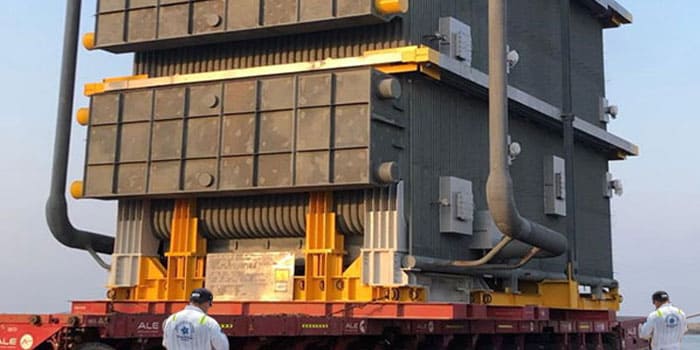
The role of a Marine Warranty Surveyor (MWS) within the gamut of handling and transportation of Project cargoes is insurmountable, but often misunderstood, sometimes perceived as an “unnecessary nuisance” by many project personnel, primarily due to their lack of knowledge of the role of MWS and its purpose.While there is no undermining the purpose of a MWS, it is equally important to realize that the correct MWS procedure is more important than the presence of the MWS itself.
With over 1100 project cargo MWS surveys under its belt, Constellation Marine services (CMS) are extremely well positioned to offer project cargo Marine Warranty surveys, and if need be, go beyond its primary purpose, by offering technical expertise in drawing up transport manuals, method statements and also risk management for the project.
CMS is a company that deeply understands the requirement of special attention towards handling and transportation of project cargoes – simply because the costs involved in project cargo damages or loss can be very large, often running into tens, possibly hundreds of millions of dollars.
CMS surveyors understand that with numerous parties involved in the execution of a project, damages to project cargos result in even higher consequential costs, with claims that are often complicated, lengthy and result in costly litigation.
Understanding the scope of the Marine warranty surveyor/s
A MWS, unless hired to serve as a marine consultant, is
always appointed to protect the interest of the underwriters.
It is also important to note that the Warranty imposing
(Underwriter) company may not be contractually obliged with
any of the assureds contractors, such as operators, riggers,
shipyards, installation contractor, designers, etc., and
therefore rely on the presence and observations of the MWS
prior to, during and post handling and transportation of
the assured’s project cargo.
In the early days, the scope of the MWS was limited to selection
of ships and tugs for cargo transportation, and to an extent,
overseeing the loading and sea fastening of the project
cargo. But with the surge of complex Marine activities such
as installation of offshore structures and the like, MWS
activities have broadened considerably and adding following
elements:
- Review engineering documents and calculations
- Verify equipment and related certificates
- Review Marine Operation Procedures
- Attend Marine operations
- Prepare report.
It is also worthwhile to note that MWS at all times act
as an independent unbiased entity during the execution of
their services, and do not necessarily include advising
services, but the better MWS companies will also on request
include these within their scope.
It is evident that client companies will usually benefit
and the increase in cost for this service is usually minimal
but the returns are high because of the costs of savings
by eliminating and or reducing re-work and maintaining schedule.
Even when such services are not included in the scope, the
better MWS play an advisory role specially in cases to break
an impasse that may have been observed or have arisen due
- Not meeting original design criteria
- Non availability of proposed equipment
- Last minute change in procedures
- Disputes between participating parties due to the above.
The Role of a Marine Warranty Surveyor
The MWS ensures that the terms of the warranty clause in
the insurance policy are complied with and that the operations
are carried out in accordance with the approved procedures
as defined in the Transport Manual or Method Statement.
Involvement of an MWS is typically where shipment of the
cargo forms a component of a larger project, including cargo
comprising of relatively small cases or Cargo Transport
Unit’s (CTU’s) through to complete modules for new infrastructure
projects.
In the latter case the shipping procedure; transport to
point of shipment, lift plans and rigging calculations,
sea-fastening and routing of the ship or tow will be the
subject of a series of procedures.
These will have been subject to professional scrutiny, possibly
by a number of disciplines, to ensure that calculations
are proved and methods for the execution of the various
aspects are approvable in line with industry guidelines.
Subject to the approval of procedures and calculations it
is then normal for the Warranty Surveyor to attend and observe
loading, securing and possibly discharging operations to
ensure that approved procedures are adhered to and to be
on hand to evaluate and approve any changes to procedures
necessitated by on-site conditions.
In cases where a Warranty Surveyor attends to approve loading
and securing of cargo it will be usual for a Certificate
of Approval (COA) or Letter of Approval (LOA) to be issued,
on completion of operations, to confirm that the previously
approved procedures have been adhered to or that he is satisfied
with on-board securing arrangements agreed with the vessel’s
staff or Supercargo.
The COA/LOA may have additional recommendations attached;
for example specifying checks to be made on lashings, records
to be noted in the vessel’s log etc.
Conclusion
Project cargoes require special attention during loading
and transportation. Specialist knowledge and experience
in the shipment of such cargoes is required to fully plan
and engineer a safe project cargo shipment.
All operations need to be carefully managed with agreed
responsibilities, risk assessments and tool-box talks.
A good MWS provides independent third-party technical review
and approval of high-value and/or high-risk marine construction
and transportation project operations, from the planning
stages to the physical execution.
By appointing an independent third party MWS to review the
whole operation from start to finish, including the final
leg of the transportation to the site, carriers and charterers
will reduce the high-risk factor associated with deck cargoes.
The attendance of an MWS will ensure that the regular areas
of failure within a deck stow such as poor lashing equipment,
insufficient use of lashing equipment, noncompliance with
the CSM, CSS Code and TDC Code, will be avoided.
This provides added peace of mind for all involved in making the voyage a success.

